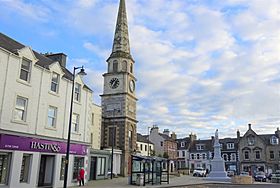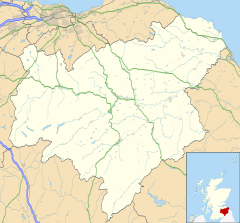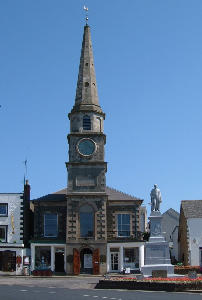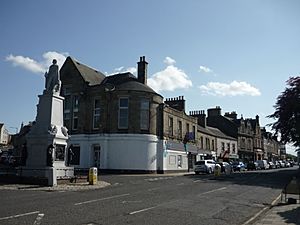Selkirk, Scottish Borders facts for kids
Quick facts for kids Selkirk |
|
|---|---|
| Town and former royal burgh | |
 Selkirk town centre, showing the town house and the statue of Sir Walter Scott |
|
| Population | 4,540 (2020) |
| OS grid reference | NT471288 |
| • Edinburgh | 31 mi (50 km) |
| • London | 301 mi (484 km) |
| Council area | |
| Lieutenancy area |
|
| Country | Scotland |
| Sovereign state | United Kingdom |
| Post town | SELKIRK |
| Postcode district | TD7 |
| Dialling code | 01750 |
| Police | Lothian and Borders |
| Fire | Lothian and Borders |
| Ambulance | Scottish |
| EU Parliament | Scotland |
| UK Parliament |
|
| Scottish Parliament | |
Selkirk is a town in the Scottish Borders area of southeastern Scotland. It's a very old and historic place, once known as a royal burgh (a special kind of town). Selkirk is located by the Ettrick Water, which is a smaller river that flows into the River Tweed. People from Selkirk are called Souters, which is an old word for cobblers, meaning people who make or fix shoes. In 2011, about 5,784 people lived in Selkirk.
Contents
History of Selkirk
How Selkirk Started
Selkirk used to be the main town of a region called Selkirkshire. It's one of the oldest royal burghs in Scotland. This means it was one of the first places where people settled in what we now call the Scottish Borders. The name "Selkirk" comes from old English words meaning "church by the hall."
The first abbey (a home for monks) in the Borders was in Selkirk. These monks later moved to Kelso Abbey. In 1113, King David I gave Selkirk a lot of land. A famous Scottish hero, William Wallace, was declared the guardian of Scotland in Selkirk in 1297. This happened at a church called the Kirk o' the Forest.
Battles and Famous Faces
Selkirk has a brave history, especially during wars. In 1513, 80 men from Selkirk went to fight in the Battle of Flodden against the English. Sadly, only one man, known as "Fletcher," returned. He brought back a blood-stained English flag as a symbol of their courage.
Later, during the Wars of the Three Kingdoms in the 1600s, Selkirk saw more fighting. A Royalist army, led by James Graham, 1st Marquess of Montrose, stayed in the town. Their soldiers were camped nearby. On September 13, 1645, an army led by Sir David Leslie attacked them. Montrose's army was defeated, and he had to escape. The captured Royalist soldiers were later executed.
Years later, in the early 1800s, the famous writer Sir Walter Scott worked in Selkirk. He was the sheriff-depute, which meant he was like a judge in the courtroom at Selkirk Town House.
Modern Times in Selkirk
In the mid-1800s, Selkirk grew because of its woollen industry, where wool was made into cloth. However, most of these factories closed in the 1970s. The town is also famous for its "bannocks," which are a type of dry fruit cake. These cakes were first sold in the market by a local baker named Robbie Douglas in 1859.
Culture and Traditions
Town Traditions
The Selkirk Common Riding is a special yearly event that celebrates the town's history. It takes place on the second Friday after the first Monday in June. During this event, people ride horses around the town's old boundaries, remembering its past.
Important Places
You can still see the remains of the "forest kirk" in the old churchyard. This was the church mentioned in old stories as St Mary of the Forest. It's also where some of the ancestors of Franklin Delano Roosevelt, who was the 32nd President of the US, are buried.
Just south of Selkirk is The Haining. This is a large house from the late 1700s that belonged to the Pringle family. In 2009, the last owner left the house and its grounds to the community of Selkirkshire. Now, a special group is planning to fix up the building and turn it into an art gallery for everyone to enjoy.
The Selkirk Grace
The "Selkirk Grace" is a well-known prayer, but it actually has no real connection to the town of Selkirk itself! It started in a different part of Scotland. Even though many people think the poet Robert Burns wrote it, the grace was known even before his time. It was called the "Galloway Grace" or the "Covenanters' Grace." It got the name "Selkirk Grace" because Robert Burns was said to have recited it at a dinner hosted by the Earl of Selkirk.
Here's the grace in two languages:
-
-
-
- In Scots
-
-
- Some hae meat and canna eat,
- And some wad eat that want it,
- But we hae meat and we can eat,
- Sae let the Lord be thankit.
-
-
-
- In English
-
-
- Some have meat and cannot eat,
- And some would eat that want it,
- But we have meat and we can eat,
- So let God be thanked.
Sports in Selkirk
Rugby union is a very popular sport in Selkirk. The local team, Selkirk RFC, plays its home games at Philiphaugh. They compete in the Scottish Premiership and the Border League.
The town also has a cricket club, which started in 1851. They still play in the Border League. The cricket ground at Philiphaugh is actually the same place where the Battle of Philiphaugh happened!
Selkirk also has a strong football history. Some famous Scottish football players, like Bobby Johnstone from Hibernian, came from the town.
Media and News
For local news and TV shows, people in Selkirk can watch BBC Scotland and ITV Border. These signals come from the nearby Selkirk TV transmitter.
You can listen to local radio stations like BBC Radio Scotland on 93.5 FM and Greatest Hits Radio Scottish Borders and North Northumberland on 96.8 FM.
The town's local newspapers are The Border Telegraph and the Southern Reporter.
Famous People from Selkirk
Many interesting people have come from Selkirk:
- James Blair (1825–1901), a Canadian farmer.
- Peter Blake (1951–2018), an actor in movies and TV.
- James Brown (J.B. Selkirk) (1832–1904), a poet and writer.
- James Marr Brydone (1779–1866), a surgeon who spotted the French fleet, starting the famous Battle of Trafalgar.
- Rae Hendrie (b. 1977), a TV actress.
- Scott Hutchison (1981–2018), Grant Hutchison (b. 1984) and Billy Kennedy (b. 1984), members of the indie rock band Frightened Rabbit.
- Bobby Johnstone (1921–2001), a Scotland international football player. He was part of the famous "Famous Five" forward line for Hibernian.
- Andrew Lang (1844–1912), a poet, novelist, and critic who also studied cultures.
- Mungo Park (1771–1806), a famous explorer of Africa.
- John Rutherford (b. 1955), a Scotland international rugby player who played for Selkirk R.F.C.
Climate in Selkirk
Like the rest of the British Isles, Selkirk has a maritime climate. This means it has cool summers and mild winters. However, the area can have some very big changes in temperature. For example, the lowest temperature ever recorded in the UK outside of the Highlands was near Selkirk, at -26.6°C (-15.9°F). On the other hand, Scotland's highest temperature, 32.9°C (91.2°F), was recorded not far away.
| Climate data for Bowhill, 168 m above sea level, 1971–2000, Extremes 1960– (Weather station 2.3 miles (4 km) to the West of Selkirk) | |||||||||||||
|---|---|---|---|---|---|---|---|---|---|---|---|---|---|
| Month | Jan | Feb | Mar | Apr | May | Jun | Jul | Aug | Sep | Oct | Nov | Dec | Year |
| Record high °C (°F) | 12.6 (54.7) |
13.9 (57.0) |
17.8 (64.0) |
25.7 (78.3) |
27.5 (81.5) |
30.3 (86.5) |
31.3 (88.3) |
30.1 (86.2) |
25.8 (78.4) |
22.2 (72.0) |
16.0 (60.8) |
14.1 (57.4) |
31.3 (88.3) |
| Mean daily maximum °C (°F) | 5.3 (41.5) |
5.9 (42.6) |
8.3 (46.9) |
11.0 (51.8) |
14.7 (58.5) |
17.1 (62.8) |
19.2 (66.6) |
18.7 (65.7) |
15.4 (59.7) |
11.7 (53.1) |
7.8 (46.0) |
5.9 (42.6) |
11.8 (53.2) |
| Mean daily minimum °C (°F) | −0.4 (31.3) |
−0.2 (31.6) |
1.1 (34.0) |
2.4 (36.3) |
4.7 (40.5) |
7.8 (46.0) |
9.8 (49.6) |
9.5 (49.1) |
7.5 (45.5) |
4.8 (40.6) |
2.4 (36.3) |
0.1 (32.2) |
4.1 (39.4) |
| Record low °C (°F) | −26.6 (−15.9) |
−17.2 (1.0) |
−15 (5) |
−6.1 (21.0) |
−4.4 (24.1) |
−1.7 (28.9) |
1.1 (34.0) |
−0.5 (31.1) |
−2.3 (27.9) |
−6.1 (21.0) |
−11.1 (12.0) |
−16.4 (2.5) |
−26.6 (−15.9) |
| Average precipitation mm (inches) | 95.16 (3.75) |
66.33 (2.61) |
74.61 (2.94) |
55.76 (2.20) |
65.4 (2.57) |
59.74 (2.35) |
58.49 (2.30) |
72.11 (2.84) |
72.75 (2.86) |
86.35 (3.40) |
86.11 (3.39) |
102.48 (4.03) |
895.29 (35.24) |
| Source: Royal Dutch Meteorological Institute | |||||||||||||
Town Twinning
Selkirk has a special friendship with a town in Germany:
 | Percy Lavon Julian |
 | Katherine Johnson |
 | George Washington Carver |
 | Annie Easley |




